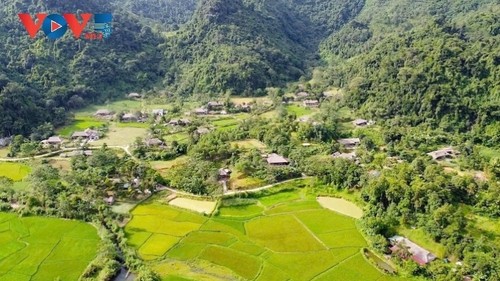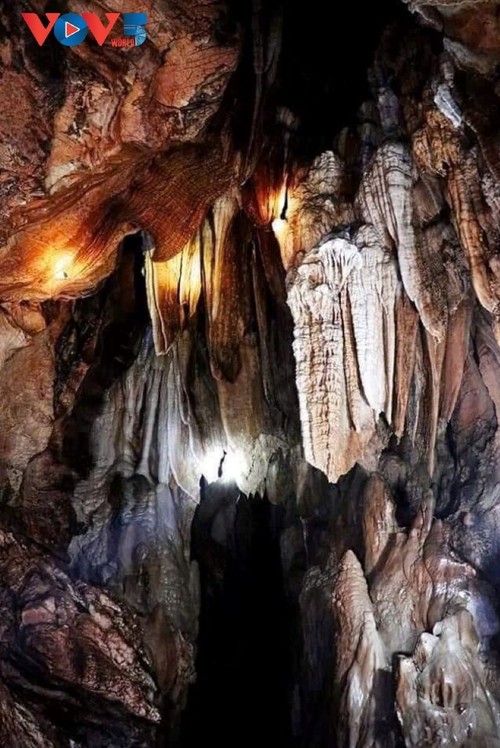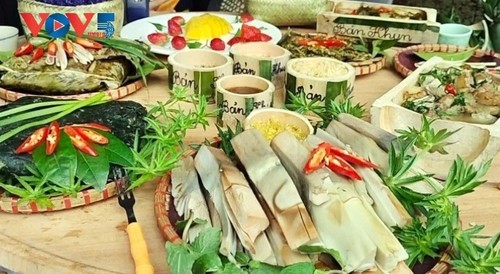 Khun hamlet in Bang Lang commune, Quang Binh district, Ha Giang province (photo: VOV) Khun hamlet in Bang Lang commune, Quang Binh district, Ha Giang province (photo: VOV) |
Khun hamlet is in Bang Lang commune, about 8 km from Quang Binh district. It’s in a tropical monsoon area with just two seasons: rainy and dry.
Khun hamlet has 178 households of the Tay, Nung, Dao, and La Chi ethnic groups, who have been living harmoniously for generations. Visitors can stroll freely around the village to enjoy the tranquil mountain atmosphere and learn about the traditional stilt houses of each ethnic group. They can watch Tay women weave brocade fabric and bamboo items, visit a Nung blacksmith, attend the Forest God worshiping ceremony of the Nung, observe the Cap Sac maturity ritual of the Dao, and join a new rice worshiping ceremony of the La Chi.
The stilt houses of the Tay, which are made of precious wood and designed to withstand harsh mountain weather, are the most impressive. The house usually has two stories. The upper part is where the family lives, while the lower part is a storehouse for farm tools and a barn for animals.
 Bo My cave near Khum hamlet (photo: VOV) Bo My cave near Khum hamlet (photo: VOV) |
When Khun hamlet began doing community tourism, they started keeping their animals in barns far from the rooms in which the visitors stay. Vang Van Tan, the owner of a homestay, said: “Tourists can experience our daily life and do seasonal work with the villagers, such as planting rice, harvesting rice, and picking corn. They can trek up the river through a primeval forest and see very tall ironwood trees, or they can participate in cultural and art activities with local artisans.”
Near Khun hamlet are several water caves, such as Bo My and Sum Khuat, that have impressive stalagmites and stalactites. Bó Mỳ cave is the source of water for 5 of 8 villages in Bang Lang commune. The water in the cave is cool and clear and in some places is chest deep.
The water that flows from the cave has schools of an indigenous fish that grows to about 2 kilograms that local people call dầm xanh.
Wading along the stream, tourists go deep into the cave to admire yellow, gray, and green stalactites. The deeper the visitors go, the more strangely shaped are the stalactites. They may look like long castle curtains, silk bunting draped on the cliff, Buddha statues, or sofas. The 20m wide by 2km long cave can accommodate hundreds of visitors.
Nguyen Tuan Vu, one of the visitors to Khun hamlet, said: “It’s a fantastic experience. To fully appreciate the beauty of Bó Mỳ cave, you should walk to its end.”
 Khum villagers treat visitors with typical ethnic dishes. (photo: VOV) Khum villagers treat visitors with typical ethnic dishes. (photo: VOV) |
Tay cuisine is an essential part of any trip to Khun hamlet. The dishes, made from natural ingredients and prepared in a simple way to retain the original flavor, include Pa-pinh-top grilled fish, pa-pho grilled fish in leaves, grilled chicken, grilled pork, sour leaf fish soup, and banana salad.
The most special dish here is "Rock Moss", which won first prize at the 1st Ha Giang International Culture, Tourism, and Culinary Festival this year. When the water is clear and clean, moss grows well on rocks in the stream. Tay people pick the young moss and process it immediately to preserve its natural flavor.
Villager Nong Van Hoang said: “Rock moss can be made into many nice dishes. The most delicious is grilled moss. The moss is seasoned with salt, lemongrass, doi seeds, and aromatic herbs, wrapped in banana or dong leaves, and grilled over hot coals. Grilled moss is usually eaten while hot with grilled stream fish to enhance the flavor.”
Khun hamlet has 10 homestays and other households offer food and cultural performances. The hamlet plans to get more households involved in community tourism and improve services to attract more tourists.